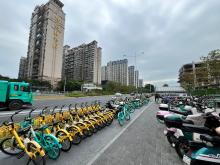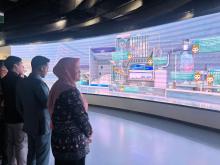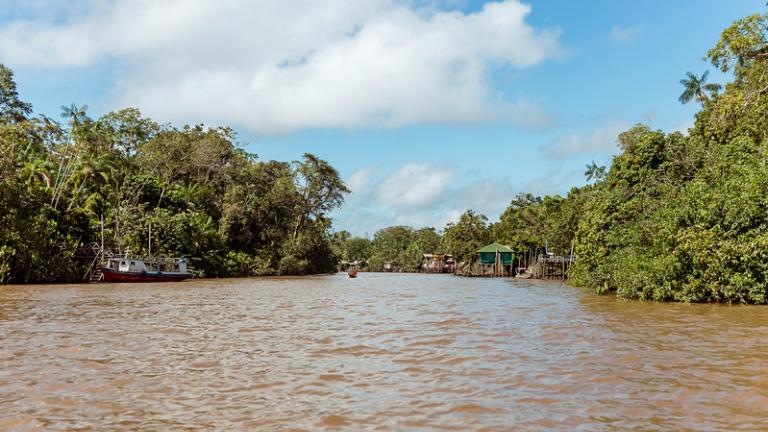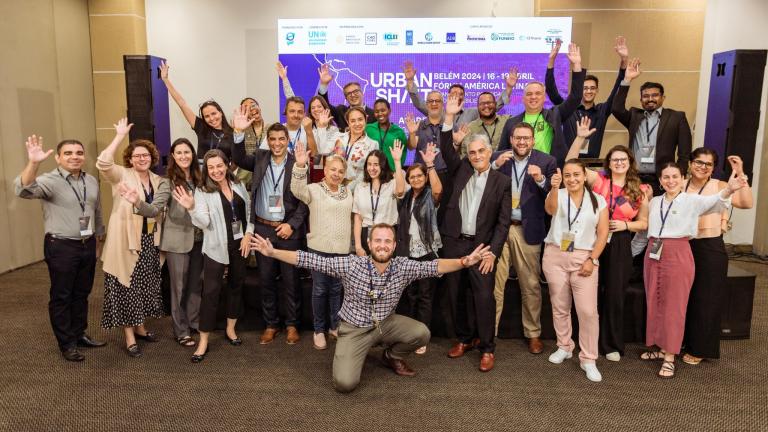Exploring Sustainability in Shenzhen: An Exchange on City-Business Cooperation
Shenzen is a leader in nature-positive, low-carbon development. This UrbanShift Peer-to-Peer Exchange highlighted ideas for how cities across Asia can learn from their innovation.
On October 28-29, we gathered in Shenzhen--a city where technology meets nature--in the Greater Bay Area of China, to be inspired by their progressive sustainability initiatives in the region. With diverse representation from cities like Ningbo, Guangzhou, Palembang, Penang Island, Melaka and Suryodaya we learnt from the city of Shenzhen and Shenzhen-born tech giants about their low-carbon and circular economy journey.
Our UrbanShift Peer Exchange began with an exciting introduction to Shenzhen during the opening of the Shenzhen International Low-Carbon City Forum. Known for its pioneering approach to low-carbon urban development, Shenzhen set the stage with a compelling showcase of its achievements:
-
An impressive 25% of Shenzhen’s car fleet and its entire public bus fleet are now electric, demonstrating a strong commitment to reducing emissions citywide.
-
Shenzhen boasts more electric charging stations than fuel stations for cars, paving the way for accessible and widespread EV adoption.
-
Shenzhen is leading with China's first carbon footprint labeling system, allowing consumers to make environmentally conscious choices.
-
The city integrates green spaces into its urban fabric with the Sponge City concept, which incorporates natural water management systems throughout. Plans for an expanded mangrove preservation area underscore Shenzhen’s dedication to ecological balance.
-
With forward-thinking policies, Shenzhen invites businesses to innovate in technology, establishing a model for successful city-business collaboration.

Shenzhen's advancements make it a fitting host for our peer exchange on circular economy and city-business collaboration. After the forum, we convened for an UrbanShift closed-door session, delving into the realities and challenges cities face in engaging businesses in circular economy practices. Local Shenzhen businesses also shared how their work aligns with city goals, sparking a dynamic exchange on collaborative strategies.
Key takeaways from the discussion include:
-
Unified Goals for Success: Aligning city and business goals is vital for successful partnerships.
-
Creating Opportunities for Innovation: Cities can foster innovation by creating spaces and opportunities for businesses to lead.
-
Community-Centric Decision-Making: The community should be at the heart of all decisions to ensure long-term success.
A Deep Dive into Technology Innovation
In the afternoon, we visited Longgang Energy Ecological Park, one of Shenzhen’s four waste-to-energy facilities. Shenzhen surpasses national standards in waste-to-energy processing, engaging the public through interactive digital and recycled art, inspiring architecture, and on-site exhibits that showcase the evolution of waste management. The plant’s building design even takes inspiration from Monet, featuring a digital art exhibit that honors his artistic legacy.

Day 2 of our Shenzhen peer exchange took us into the heart of Shenzhen’s business ecosystem to explore sustainable innovations in technology and manufacturing. We started the day with a visit to Sunwoda, the world-renowned leader in lithium-ion battery production and energy storage solutions. Since 2021, Sunwoda has accelerated its commitment to sustainability, setting ambitious climate goals, including Carbon Peak by 2029 and Carbon Neutrality by 2050. Their dedication aligns with stringent EU standards on battery production and recycling, and they’re actively developing “battery passports” to track the lifecycle and recycling potential of their products.
Cross-City Learning
Following our visit to Sunwoda, we reconvened with city representatives to discuss climate action strategies and share insights on clean energy, climate planning, and the circular economy. Representatives from nine cities, including Shenzhen, Kyoto, Hong Kong, and Melaka, along with six innovative businesses working in energy storage, waste management, and building efficiency, presented their unique approaches and challenges.
As Yunfei Xu, Deputy Director of the Shenzhen Development and Reform Commission, said in his opening remarks, “Shenzhen is a hub for sustainability solutions in China. We are ahead on so many fronts and are ready to learn from our counterparts.” This spirit of mutual learning set the tone for an engaging day of exchanges and discussions on tackling sustainability challenges.
Another highlight of the day was the launch of the ICLEI East Asia Carbon Neutral Cities Accelerator, a platform designed to help East Asian cities share best practices and collaborate on carbon neutrality. The accelerator includes a compendium of case studies, peer learning events, and annual knowledge exchanges, featuring early case studies from Seoul, Hong Kong, and Kyoto. This initiative will be a valuable resource for cities across the region in their journey toward net-zero emissions.
During our discussions, city representatives identified several actionable steps to further their carbon neutrality goals:
-
Clear Goal Setting: Establishing goals in action plans and strategies is crucial to instill investor confidence and invite business engagement.
-
Community Engagement: Raising public awareness and engaging communities is essential for successful implementation.
-
Cross-City Learning: Peer exchanges provide invaluable insights and allow cities to learn from best practices across regions.
-
Tailored Approaches: Recognizing that there is no “one size fits all” solution, cities must find approaches that align with their unique roadmaps while collaborating effectively with businesses.

China City-Business Collaboration Accelerator (CiBiX) Workshop
This workshop will accelerate public-private collaboration around waste reduction, management, and reuse in Chengdu.

Lessons from the Global South's public-private climate collaborations
Spanning 30 cities in the Global South, UrbanShift's new guide to public-private collaboration highlights partnership models and best practices.

How an Urban Bioeconomy can Promote Healthy Ecosystems and Spur Sustainable Economic Prosperity
In Belém, Brazil and other Latin American cities, this concept—which emphasizes circularity, renewable resources, and the development of green infrastructure—is already taking root and reshaping local economies.

Circular Cities at the Forefront: Insights from UrbanShift's Latin America Forum
Cities can play a major role in reducing waste, improving efficiency, and spurring sustainable economic transformations. Learn how the UrbanShift Latin America Forum elevated the idea of a circular economy for cities.
